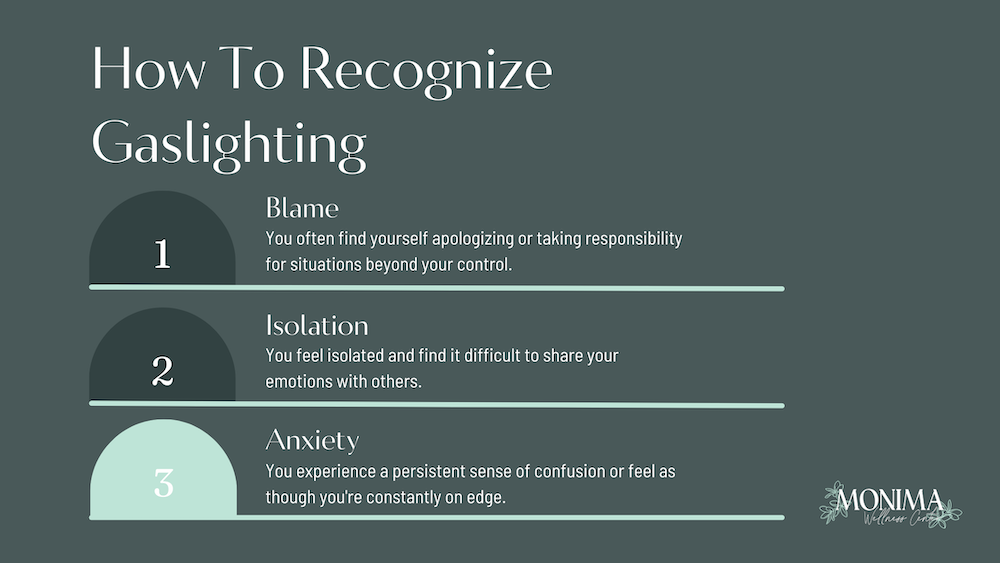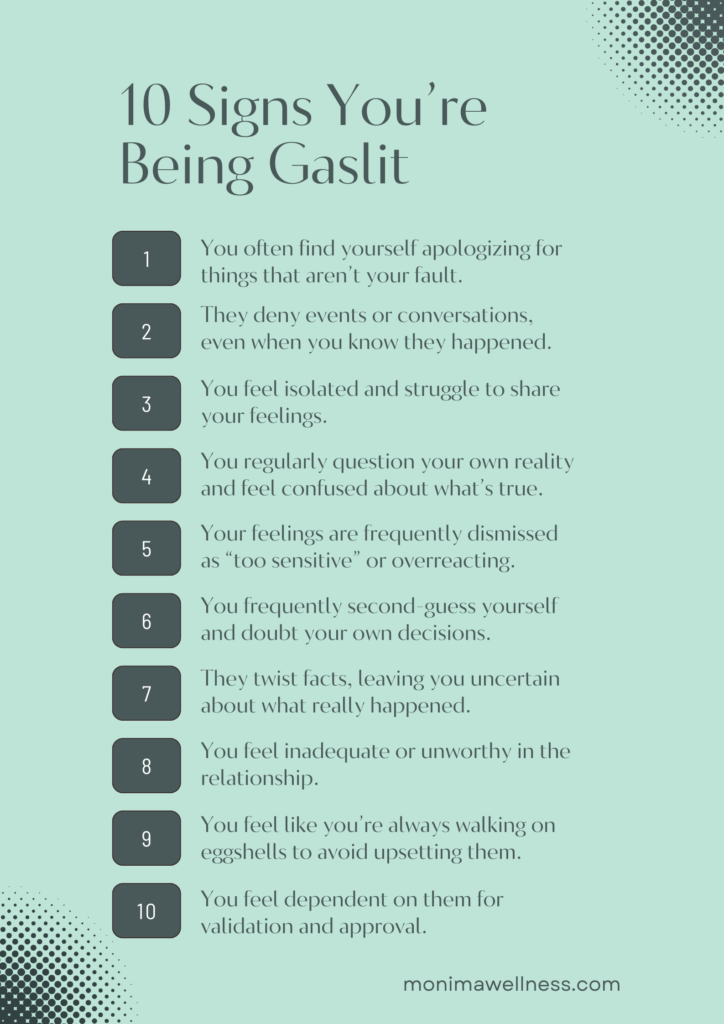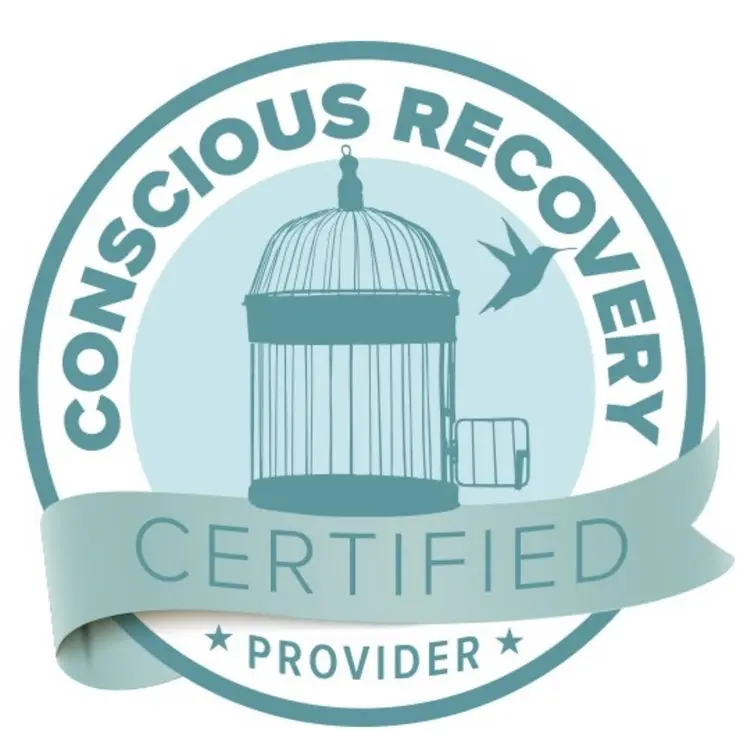
Have you ever found yourself constantly second-guessing your own thoughts, feelings, or even memories? If so, you may be experiencing gaslighting—a subtle yet dangerous form of emotional abuse that manipulates your sense of reality. Gaslighting can happen in any relationship, whether it’s romantic, familial, or professional, and its long-term impact on mental health can be devastating.
In this article, we’ll explore ten common examples of gaslighting and highlight the key phrases often used by gaslighters to make you doubt yourself. Recognizing these signs can empower you to take control and seek the support you need.
Are you struggling with gaslighting or emotional abuse? Contact Monima Wellness Center and talk to a mental health professional today.
Call: 858-500-1542 | Verify Insurance
What Is Gaslighting?

Gaslighting is a manipulative tactic where someone makes you question your reality, memories, or feelings. It’s often done gradually, causing the victim to feel confused, anxious, and dependent on the gaslighter for their sense of reality. This form of emotional abuse can have severe effects on mental health, leading to conditions like depression, anxiety, and even PTSD.
If you’re feeling lost or unsure of your reality, you’re not alone. Monima Wellness offers supportive therapy for women who’ve experienced gaslighting and emotional abuse.
Learn More: Intimate Partner Violence
10 Common Gaslighting Tactics

As mentioned, gaslighting is a psychological manipulation tactic where someone distorts the truth, causing the victim to doubt their own perceptions, memories, or feelings. Below are ten common gaslighting examples that aim to undermine your sense of self and leave you questioning your reality.
1. “That Never Happened”
One of the most common gaslighting tactics is flat-out denying something that did happen. When someone repeatedly says, “That never happened,” even though you remember it clearly, you second-guess your memory. Over time, this can leave you feeling unsure of what’s real and what’s not.
2. “You’re Too Sensitive”
Gaslighters often brush off your feelings by telling you you’re “too sensitive” or “overreacting.” This makes you doubt whether your emotional reactions are valid, and you might start to wonder if you really are being unreasonable. Spoiler alert: you’re not. It’s a tactic to make you feel small.
3. “You’re Imagining Things”
This is a classic way to make you question your perception of reality. When you bring up a concern, they dismiss it with, “You’re imagining things.” This can make you feel paranoid or even irrational as if you’re the one who’s wrong for even bringing it up. It chips away at your confidence in your own judgment.
4. “Everyone Else Thinks You’re Crazy”
An individual who is gaslighting you might try to make you feel isolated by claiming that other people agree with them. They might say something like, “All your friends think you’re crazy too.” This is meant to make you feel alone, with no one else to trust except them—even though they’re the person causing the problem.
5. “You’re Overthinking It”
Have you ever expressed a concern only to be told, “You’re overthinking it”? This is a tactic to make you second-guess your gut instincts. It makes you feel like you’re blowing things out of proportion, even when your concerns are valid.
6. Withholding Information or Refusing to Engage
Gaslighters sometimes refuse to engage in conversations about important issues or withhold information. When they say things like, “I don’t know what you’re talking about,” they’re avoiding accountability. This leaves you feeling confused and unsure about the situation because they’ve dodged the conversation altogether.
7. “It Was Just a Joke”
Ever had someone say something hurtful and then brush it off with, “It was just a joke”? This is a way for gaslighters to make you feel like you’re overreacting. It makes you question whether your feelings are valid, even when the comment was clearly inappropriate or mean-spirited.
8. Shifting Blame
Instead of owning up to their mistakes, gaslighters will often turn the tables and blame you. They’ll say things like, “This is all your fault,” or “You made me act this way,” making you feel responsible for their behavior. This tactic can leave you feeling guilty for things that aren’t even your fault.
9. Contradictory Statements
A gaslighter might say one thing one day and completely deny it the next. For example, they could claim, “I never said that,” when you know they did. These mixed messages create confusion and make you question your own memory and understanding of the situation.
10. “If You Really Cared About Me, You Wouldn’t Even Think That”
This phrase uses your own love and care against you. The gaslighter might say, “If you really cared about me, you wouldn’t even think that,” making you feel guilty for expressing concerns. This emotional manipulation makes you question your own feelings and discourages you from standing up for yourself.
How to Recognize Gaslighting
While these examples highlight the phrases gaslighters commonly use, there are also deeper psychological impacts that can help you identify this emotional abuse.
You may notice that you’re constantly questioning yourself, feeling confused about events that previously seemed clear, or doubting your ability to trust your own emotions.
Common signs you’re being gaslit:
- You frequently apologize or feel responsible for things beyond your control.
- You feel isolated and unable to talk about your feelings with others.
- You feel like you’re “losing it” or constantly walking on eggshells.
If you recognize these signs, Monima Wellness can help you regain clarity and rebuild your sense of self. Contact us today to begin your journey toward healing and reclaiming your mental well-being.
Call: 858-500-1542 | Verify Insurance
What To Do If You’re Being Gaslit
When dealing with gaslighting, it’s important to respond carefully and thoughtfully to protect your mental well-being. Here are a few tips:
- Document incidents: Keep a record of specific instances when you feel gaslighted to ground yourself in reality.
- Don’t argue with the gaslighter: Arguing can be futile, as the gaslighting individual will often deny or twist facts.
- Build a support system: Talk to trusted friends, family, or a therapist who can help you validate your experiences.
- Trust yourself: Rely on your instincts, even if you’re being told otherwise.
Need help overcoming emotional abuse and gaslighting? Reach out to Monima Wellness, a trusted women’s trauma treatment center in San Diego, and start healing with the support of compassionate, expert care.
Call: 858-500-1542 | Verify Insurance
Gaslighting in Different Settings
While gaslighting is often discussed in the context of romantic relationships, it can occur in many different environments. Whether it’s at work, in friendships, or even within families, the impact can be just as damaging.

Let’s explore how gaslighting shows up in different areas of life:
1. Gaslighting at Work
In the workplace, gaslighting can take the form of manipulative behavior from supervisors or coworkers. For example, a manager might deny ever giving specific instructions, leaving you questioning your memory and competence.
If your boss repeatedly says, “I never asked you to do that,” despite clear evidence to the contrary, you may start doubting your ability to do your job. This kind of manipulation can affect your self-esteem and make you feel incompetent, even when you’re doing your best.
2. Gaslighting in Friendships
Friendships can also be a breeding ground for gaslighting. A gaslighting friend might dismiss your feelings by saying things like, “You’re overreacting” or “You’re too dramatic,” whenever you bring up an issue.
Over time, you may start to question whether your emotional responses are valid or if you’re being unreasonable. This can create a toxic dynamic where the friendship feels one-sided, leaving you feeling invalidated and unsupported.
3. Gaslighting in Families
Gaslighting can also happen within families, where the emotional bonds can make it even harder to recognize. A family member might deny events from your childhood, saying, “You’re remembering it wrong,” or claim that certain painful experiences never happened.
This can lead you to doubt your own memories and question your perception of the past. When it’s coming from someone close to you, like a parent or sibling, this manipulation can be especially damaging, as it undermines your sense of identity and history.
4. Gaslighting in Romantic Relationships
Of course, gaslighting is most commonly associated with romantic relationships. A partner might frequently deny things they’ve said or done, twist the truth, or blame you for their actions. For instance, they might say, “You’re imagining things” or “That never happened,” making you question your own reality.
Over time, this can erode your confidence, leaving you dependent on the gaslighter for validation.
Reclaim Your Peace with Monima Wellness

Gaslighting can distort your sense of reality, self-worth, and relationships. If any of these examples resonate, take the first step toward healing. At Monima Wellness, we help women break free from emotional manipulation, rebuild their confidence, and find peace through personalized therapy and holistic care.
Don’t let emotional abuse define your path—reach out to Monima Wellness today and start your journey to healing.
Call: 858-500-1542 | Verify Insurance
References
1. Klein, W., Li, S., & Wood, S. (2023). A qualitative analysis of gaslighting in romantic relationships. Personal Relationships, 30(4), 1316-1340. https://doi.org/10.1111/pere.12510
2. March, E., Kay, C.S., Dinić, B.M. et al. “It’s All in Your Head”: Personality Traits and Gaslighting Tactics in Intimate Relationships. J Fam Viol (2023). https://doi.org/10.1007/s10896-023-00582-y


